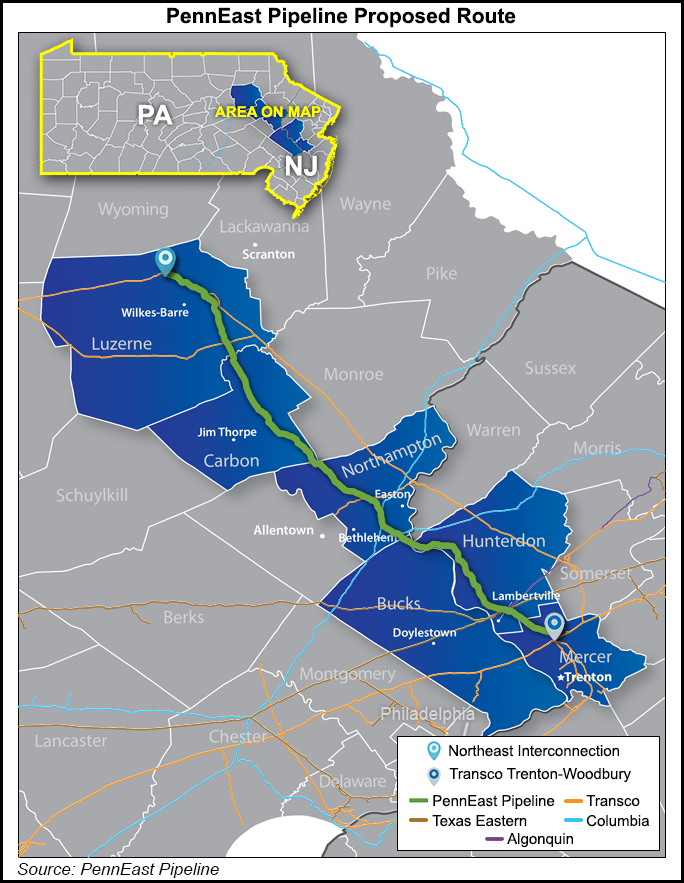Regulatory | Infrastructure | NGI All News Access | NGI The Weekly Gas Market Report
NJ DEP Says PennEast Permit Application Incomplete, Lacks Landowner Sign-Off
The New Jersey Department of Environmental Protection (NJDEP) notified PennEast Pipeline Co. LLC Wednesday that its application for a state freshwater wetlands permit is incomplete, due in part to a lack of landowner permission to survey certain parts of the proposed route.

The company characterized the NJDEP’s letter as procedural, while opponents hailed the move as a setback for the project.
In a letter to PennEast, NJDEP detailed a list of additional information the company will need to submit before its freshwater wetlands permit application can be considered complete, including information requiring survey access to gather.
“It is clear the applicant does not yet have legal authority to perform the activities proposed in the application on the site, and to carry out all requirements” under New Jersey state law “for the full length of the project right-of-way,” NJDEP wrote.
The agency said PennEast would be able to substitute a Federal Energy Regulatory Commission certificate of public convenience and necessity for landowner signatures on its application. But NJDEP added that “even though the FERC certificate would be a milestone that will allow PennEast to sign the application form…the application will remain administratively incomplete until the then-current owners provide written consent to access their properties, as the department will still lack the authority to inspect the subject properties.
“…The department needs to inspect the subject properties and adjoining regulated lands in order to verify the accuracy” of information related to the application, NJDEP said. “The lack of accurate resource information would also preclude neighbors and the public from commenting an on accurate submission.”
NJDEC told PennEast it has 30 days to “address the deficiencies” in its application and submit the additional information requested. If the information isn’t provided within 60 days NJDEP said it “may administratively close the application.”
PennEast spokeswoman Patricia Kornick told NGI in an email Thursday that “NJDEP’s actions are another step in the multi-year approval process. PennEast looks forward to continuing its collaborative work with the NJDEP and will submit supplemental information to support the existing application, which is very typical in this stage of a project.”
Added Kornick, “PennEast does not yet have authority to access properties where landowners have not granted permission. Under a well-established process, a FERC certificate will grant PennEast applicable authority to collect some environmental (wetlands, threatened and endangered species and archaeological resources) survey data, which will be used to supplement applications.
“Approximately 70% of landowners along the route now have provided survey permission, and PennEast is conducting surveys on those properties…PennEast always welcomes constructive discussions with landowners, and the continued increase in survey permissions reflects the collaborative spirit that PennEast is committed to fostering.”
PennEast, a 120-mile greenfield pipeline that would transport 1.11 million Dth/d of Marcellus Shale gas to markets in Pennsylvania and New Jersey, has a proposed route starting in Luzerne County, PA and terminating at an interconnect with the Transcontinental Gas Pipe Line in Mercer County, NJ. The project is 90% subscribed under long-term contracts with local gas utilities, power generators and other customers.
The project, a joint venture of Spectra Energy Partners LP, UGI Energy Services, Southern Company Gas, PSEG and SJI Midstream has faced pushback, including from environmental groups and from politicians.
Jeff Tittel, director of the New Jersey Chapter of the Sierra Club, said NJDEP’s actions this week represent “the first big setback for PennEast in their attempt to build this dangerous and unnecessary pipeline…it also shows that what we’ve been doing has worked. By not allowing PennEast to come on those properties, they can’t get enough information to apply for, let alone get, permits. I think that’s critical.”
Tittel pointed to the potential for delays to the project if it has to wait on a FERC certificate before it can complete its application for a state water permit from New Jersey, particularly given the Commission’s current lack of a quorum.
FERC has only two out of five sitting commissioners since former Chairman Norman Bay’s resignation in February. PennEast received a favorable final environmental impact statement from FERC earlier this month, but the project will have to wait on new appointments to the Commission before it can hope for a certificate order.
PennEast is targeting an in-service date sometime in the second half of 2018.
While PennEast’s New Jersey permit application was filed in connection with federal regulatory requirements still pending, state water permits have caused major headaches recently for pipeline developers looking to cross through neighboring New York.
Last year, New York state denied a crucial water permit to the Constitution Pipeline, delaying the FERC-approved project. Earlier this month, New York followed that up by denying a water permit application filed for National Fuel Gas Co.’s Northern Access expansion project.
© 2024 Natural Gas Intelligence. All rights reserved.
ISSN © 1532-1231 | ISSN © 2577-9877 | ISSN © 1532-1266 |
